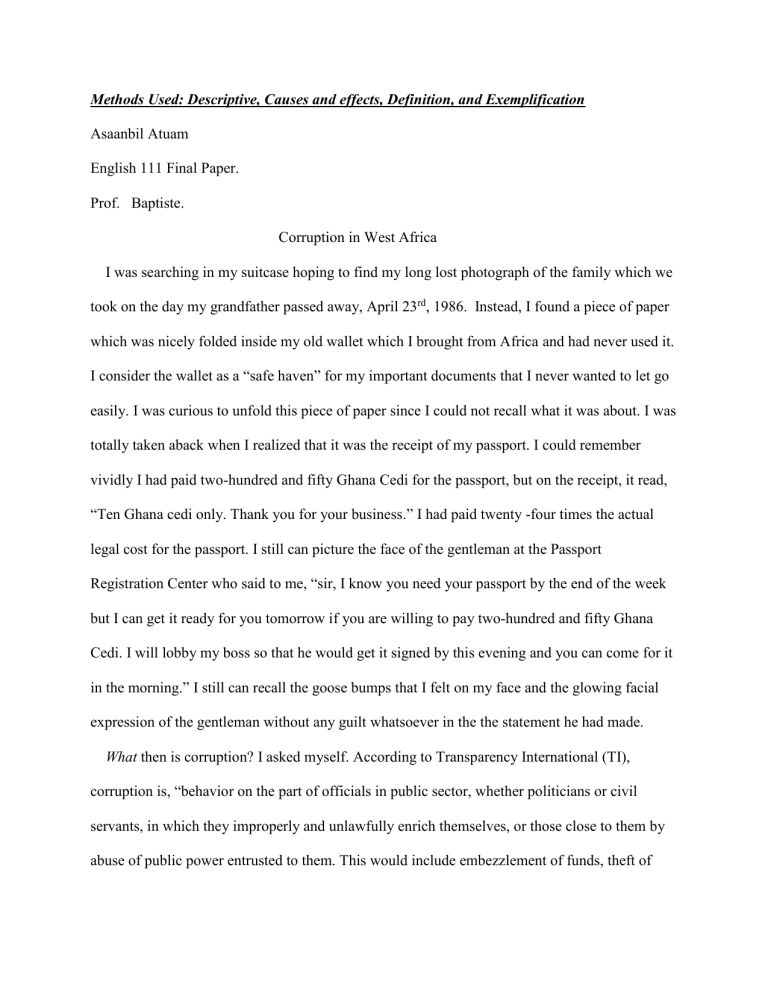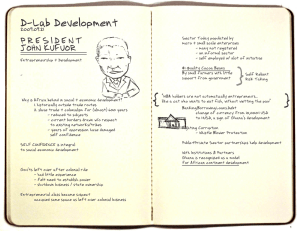
Methods Used: Descriptive, Causes and effects, Definition, and Exemplification Asaanbil Atuam English 111 Final Paper. Prof. Baptiste. Corruption in West Africa I was searching in my suitcase hoping to find my long lost photograph of the family which we took on the day my grandfather passed away, April 23rd, 1986. Instead, I found a piece of paper which was nicely folded inside my old wallet which I brought from Africa and had never used it. I consider the wallet as a “safe haven” for my important documents that I never wanted to let go easily. I was curious to unfold this piece of paper since I could not recall what it was about. I was totally taken aback when I realized that it was the receipt of my passport. I could remember vividly I had paid two-hundred and fifty Ghana Cedi for the passport, but on the receipt, it read, “Ten Ghana cedi only. Thank you for your business.” I had paid twenty -four times the actual legal cost for the passport. I still can picture the face of the gentleman at the Passport Registration Center who said to me, “sir, I know you need your passport by the end of the week but I can get it ready for you tomorrow if you are willing to pay two-hundred and fifty Ghana Cedi. I will lobby my boss so that he would get it signed by this evening and you can come for it in the morning.” I still can recall the goose bumps that I felt on my face and the glowing facial expression of the gentleman without any guilt whatsoever in the the statement he had made. What then is corruption? I asked myself. According to Transparency International (TI), corruption is, “behavior on the part of officials in public sector, whether politicians or civil servants, in which they improperly and unlawfully enrich themselves, or those close to them by abuse of public power entrusted to them. This would include embezzlement of funds, theft of corporate or public property, as well as corrupt practices such as bribery, extortion or influence peddling.” Corruption is something we talk about in daily basis, it is something whose negative impact we recognize, and even the corrupt acknowledges it. The level of tolerance of corruption among West Africans is overwhelming. But the the true irony and tragedy is that, those who engaged in corruption loves it. They tend to see it as a “normal” day- to- day practices. The sources of corruption in West Africa are like the mouth of an octopus. Numerous. Politicians in West Africa seems to forget their roles. They were elected by the people to represent them as their mouth piece. To be the voice of the voiceless. To exercise the legislative power of the State in accordance with the Constitution. Assenting and signing Bills. Uphold the Constitution. Preserve the safety and homeland of their countries. They seemed to have lost these powers invested on them by their constituents to corruption. Corruption not only annihilates the legitimacy of government by people who could curb it, it contributes to nations instability. Corruption is the most eminent reason for military takeovers in West African countries. Internal conflicts with spillover effect have severely buckled West African countries socioeconomic development over the past few decades. The states of Liberia, Sierra Leone, Guinea, Nigeria, and most recently Cote d’Ivoire which has witnessed political calamities due to corruption have had negative impacts on their developmental projects such as infrastructure and peace building among neighboring countries. The conflict between the Kusasis and the Manprusis in the northern part of the Republic of Ghana over a piece of land is a result of corruption. Many notable people in the political realms of Ghana has lost their lives to corrupt practices. Corruption seems not to be wearing its ugly head in the political environment only. The Judiciary which suppose to the beacon of truth, a branch of government responsible for the interpretation of the law, applying laws in individual cases, and deciding if laws violate the Constitution has recent past came under the umbrella of corruption. The Judicial system in Ghana for example, in August 2015, twenty judges and magistrates were sacked after being found guilty of bribery and corruption. It was the biggest judicial scandal ever in the nation’s history. Anas Aremeya Anas, a lawyer and an investigative journalist revealed hard core evidence showing judges demanding bribes and sex to influence judgements in court cases. The evidence which was a five- hundred-hour long documentary with both audio and video version was aired on Ghana’s most televised news agencies like TV3, Ghana Broadcasting Corporation(GBC), and was also televised in Aljazeera News Channel. The documentary which was entitled “Ghana in the Eyes of God, an Epic of Injustice” exposes twelve most notable high court judges who had received bribes that had influenced their judgements. The Panama Papers was not just an unprecedented leak of eleven million plus files from the database of the world’s fourth biggest offshore law firm, Mossack Fonseca about rich and greedy leaders of the developed world, West African politicians and leaders were among them. James Ibori, former governor of Nigeria’s oil-rich Delta State from 1999 to 2007 was among them. He did not only plead guilty of conspiracy to defraud and money laundering offences, he admitted to using his power as a governor to corruptly gain and advert up to seventy-five million dollars out of the state coffers of the Federal Republic of Nigeria through a network of offshores companies in 2012. West Africans still engage in primitive accumulation of wealth. They have houses in every capital cities of the world which they never lived in, they have beds made of gold which the never slept on because they have no sleep anyway. The buy food which the cannot even eat because they long lost the appetite for it. Indeed, the conscience of West Africans need to be reawaken so that they can realize the impact of corruptions in development of our continent. The private sector is another source of corruption among West African states. Infrastructural and development projects which are often awarded in contract bases for the development of the nations are often not supervised due to corruption. These businessmen after winning the contracts would bribe authorities to prevent them from conducting routine inspections on the work they do. They either end up using cheap materials for the projects which would not last long or end up not completing the projects at all. The duties of the Police Service of West African states are feasible. Protecting law and order. It is an established fact that many police personnel in West Africa go beyond the call of their duties. It is also true the police department of many West African countries are where corruption lives, breaths and grows. Ghana for example, it is not uncommon to see police officers distorting bribes from criminals like drunk drivers and let them go free. This is not different from Nigeria, Benin, Burkina Faso, Gambia, Guinea, Ivory Coast, Liberia, Mali, Niger, or Togo. The impact of corruption in every society are enormous. Corruption is a global threat. “It is a serious roadblock to economic development," said the Executive Director of the United Nations Office on Drugs and Crime (UNODC), Yury Fedotov. It is an undeniable fact that West African countries unemployment rates are still are at alarming rates. Many West Africans are very hard working individuals and entrepreneurs but corruption has made it difficult if not impossible, for these people to get loans from the big Banks to establish a business. Low per capita income, poor living conditions, and poverty are often the ultimate results. In the political sphere, corruption impedes democracy and the rule of law. Many innocent victims are locked up in jails for the crime they did not commit, and many have received shorter sentences or no sentences at all due to corruption. Many cases are still pending in higher courts of West African nations not because the authorities are still gathering evidence, but because it involves high profile individuals who have the power to influence decisions. Hence, the old adage, “justice delayed is justice denied.” It’s a laudable idea however, that some West African leaders are beginning to turn a new leaf. They begin to realize the negative impact of corruption on the socio-economic development of their countries and therefore, began to undertake prudent measures to combat this moral canker. Transparency International (TI) - Corruption Perception Index (CPI) recently gives a clear indication that some West African nations are on the right path in the fight against corruption. Ghana for instance, in the latest edition, was ranked 56th out of one-hundred and sixty-eight (168) countries, with a score of 47, which makes it the seventh best African country on the index. Ghana Integrity Initiative (GII), the Anas Aremeyaw Anas exposé among other strategies has laid a foundation in the aid of combating corruption in Ghana. World Leaders and organizations such as the Organization of Economic Cooperation and Development (OECD); the World Economic Forum – Partnering Against Corruption Initiative, and the Special Representative of the UN Secretary General on Business and Human Rights, all needs to collaborate to bring feasible measures to combat corruption. Naming, shaming and jailing of people who are engaged in corrupt practices, especially those whose divert government funds to their private accounts should be dealt with squarely and amicably to serve as a deterrent to others. Nobody should be above the law. Whether the president or the ordinary citizen, the law must be applied fairly and squarely if any engages in corruption. Offshore companies should be regulated in their operations. Many of these offshore companies accepts goods and services from individuals without asking for the proper documentations. It is heartbreaking how funds that are meant for economic development are diverted into individual pockets and channeled into these offshore companies. The sad news is that, owners of these offshore ventures are well informed of greedy politicians and public officials who uses dubious means to acquire these monies yet, they agree to keep it for them anyway. The good news is that, there is still time. There is time for the conscience of the people of West African states to be reawaken. When West Africans begin to realize that primitive accumulation, willing to stay in political office against the will of the people, delaying prosecutions of criminals just because they can buy justice, does not only create division among the people, but causes anarchy and national instability and the consequences are brutal. The people of West African states would begin to realize that corruption is a malignant melanoma that must not be allowed to metastasize. References. (1) Addo, P., Cross-Border Activities in West Africa: Options for Effective Responses, KAIPTC Paper No. 12, May 2005 p. (2) UN Office for West Africa (UNOWA), Life after State House: Addressing Unconstitutional Changes in West Africa, Issues Papers, March 2006 p.38.

